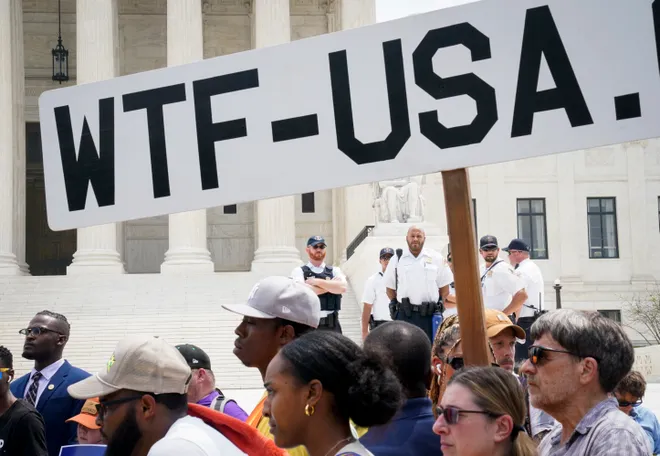Don't pay federal student loans? As pause lifts, experts warn against boycotting payments
Now that the Biden administration’s plan for student loan forgiveness has been overturned, many borrowers are considering taking matters into their own hands by boycotting payments, according to a recent poll.
Sixty-two percent of the 1,000 federal student loan borrowers surveyed by independent researcher Intelligent.com this month said they’re likely to withhold payments, and about half believe the boycott could lead to total debt forgiveness.
With 43 million Americans collectively holding more than $1.75 trillion in outstanding student loans, some borrowers believe a mass boycott could increase their collective bargaining power, said Rikin Shah, former head of business operations at student loan refinancing company Earnest and now chief executive of life insurance broker GetSure. In some instances, boycotts can work (remember Bud Light?), but financial experts warn this one is likely to fail and end up only hurting the boycotters.
“While collective action can be powerful and can lead to change, boycotting loan repayments comes with too little chance of success and too high personal financial risk,” Shah said.
Why are borrowers considering a boycott?
Borrowers, strained by two years of elevated inflation and the highest interest rates since 2001, may feel desperate, Shah said.
Learn more: Best credit cards of 2023
Forty-eight percent of borrowers see student debt as a national crisis, said a survey by consumer financial services company Bankrate of 3,684 adults who have had or now have student debt. And about 20% of borrowers will likely struggle once payments resume, Consumer Financial Protection Bureau data shows. Payments are resuming at a time consumers are already feeling squeezed and relying more on credit cards to survive. Credit card debt reached a record $1.03 trillion in the three months to June, the New York Federal Reserve said.
Most “households with student debt have had to put off major financial decisions and milestones because of their loans,” Bankrate’s report said. “They’re delaying buying a house, having children or getting married, and are saving less for retirement or emergencies.”
Why is a boycott unlikely to succeed?
The government has no financial incentive to cave.
“The problem here is that the counterparty is the federal government,” Shah said. "They don't have to budge for economic reasons, and there is no precedent for their doing so.”
Also, “legally, the federal government does not have to forgive loans due to a payment strike,” he said. “Loans can only be discharged through existing forgiveness programs or changes to the law."

What could go wrong for boycotters?
Boycotters will suffer severe financial consequences, experts say.
Biden’s administration has said financially vulnerable borrowers who miss monthly payments between Oct. 1 and Sept. 30, 2024, will not be considered delinquent, reported to credit bureaus, placed in default, or referred to debt collection agencies. However, interest begins accruing on Sept. 1, which will increase borrowers' debt balances.
Also, once that “on-ramp” period ends next year, boycotters could start facing damaged credit scores, garnished wages, seized tax refunds and more, Shah said.
“The federal government has extraordinary powers to collect on defaulted student loans, like wage garnishment without a court order and withholding of Social Security benefits, so avoiding payments is very difficult,” he said.
Mark your calendar:Student loan payments to restart soon as pause ends: Key dates to remember.
What should borrowers do instead?
Borrowers should prepare to repay their loans. Steps include:
- Estimate your monthly student loan payment and check out the new income-driven repayment plan. Under the plan, you may owe as little as $0 a month. After making payments for a set number of years, you could even get your remaining balance forgiven.
- Check your employee benefits. For example, Aetna matches employees’ U.S.-based student loan payments up to $2,000 a year for a lifetime maximum of up to $10,000 for qualifying loans; PwC offers associates and senior associates up to $1,200 a year toward student debt; and Google matches up to $2,500 a year.
- Cut expenses and pick up a side hustle. Despite many saying they’ll likely boycott payments, 72% of all respondents in Intelligent.com’s survey said they are or will take on more paid work to prepare for payments resuming. Fifty-one percent say they have or plan to start a side hustle; 34% have or will take on more hours at their current job; and 21% have or will get an additional job.
While repaying, borrowers can also continue advocating for policy change through traditional channels like voting and supporting legislative measures that address student loan reform, said Shah, acknowledging that this may be a “slower and less satisfying option.”
Medora Lee is a money, markets, and personal finance reporter at USA TODAY. You can reach her atmjlee@usatoday.com and subscribe to our free Daily Money newsletter for personal finance tips and business news every Monday.
Disclaimer: The copyright of this article belongs to the original author. Reposting this article is solely for the purpose of information dissemination and does not constitute any investment advice. If there is any infringement, please contact us immediately. We will make corrections or deletions as necessary. Thank you.







